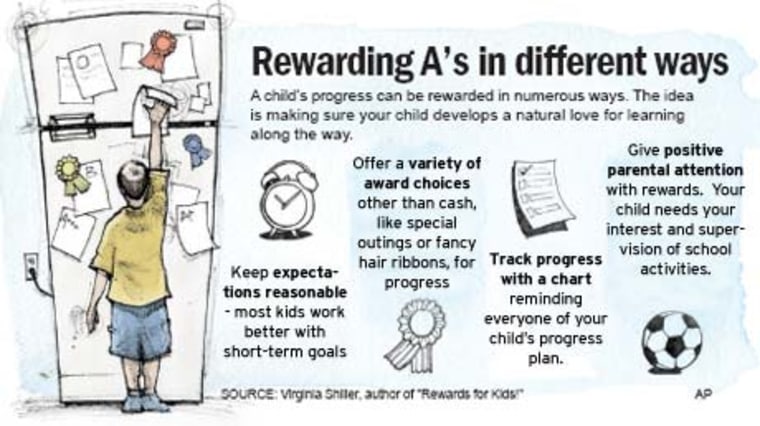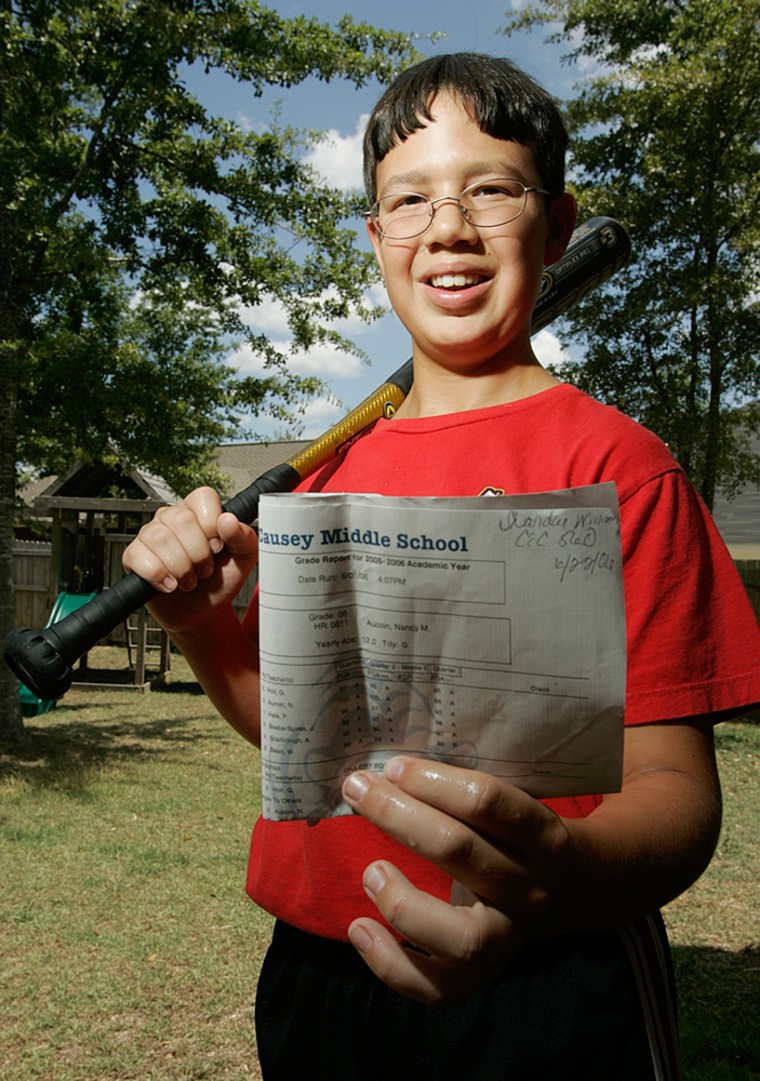Sure, learning is its own reward. But some kids respond best to cash.
Andrew Waller's grades soared when his parents started offering $5 for A's and $4 for B's. Now he pockets about $25 each report card, saving it for video games and summer camp.
"I think I would still be getting good grades, but this does help. I mean, it helps a lot," said Andrew, a 12-year old from Mobile, Ala. "I think it's a great way to motivate me."
So you want an A, eh? Are you willing to pay?
As children return to school, many parents are deciding what prize — if any — is appropriate to offer when kids get good grades. The stakes can get pretty high.
Reagan Hawkins, a high school teacher in Nederland, Texas, has had students tell him they will get a new car for A's. Their parents downgrade the deal to a used car if they get B's.
"It disappoints me, honestly," Hawkins said. "I try to instill a sense of intrinsic reward in the students. I'd rather see a student want to learn for the sake of learning than learn for the sake of a car."
Adults who promise money, gifts or privileges say their children study harder when incentives are on the table. The lesson they hope to teach is that rewards require work.
Report-card rewards
The trick is making sure that students develop a natural love of learning along the way. When the gift cards and iPods go away, students had better be able to motivate themselves.
"It may be a little bit of bribery, but I'm sorry, I bribed my little one with M&Ms when we were doing potty training," said Dawn Waller, Andrew's mom and a former teacher.
"I think everyone ought to be rewarded when they're doing something well," she said. "For us, five dollars (for A's) was just the amount we could afford."

She and her husband, David, say their system is working.
Andrew proudly shares his math homework. Kathryn, his 8-year-old sister, talks of becoming a scientist. Even their 4-year-old brother, John Martin, behaves better when he knows he'll end up with a toy from the dollar store.
Nationwide, parents reward A's in all kinds of ways.
Children earn trips to the bookstore, the bowling alley or the ice rink. They get to stay up later, take a day off from chores, or move a TV into their room. Some get bragging rights, like having their report card displayed front and center on the fridge.
In Snellville, Ga., Marlyn Tillman refused to give her two sons cash for A's. That was over the line. Instead she gave them stickers at young ages, then trips out for ice cream.
By high school, she said, "We have no rewards. You're shaping your own future at that point, and that absolutely is its own reward. It's your job and you're expected to do it."
Still, incentives come into play at home. For every half-hour her 13-year-old wants to spend playing video games, he must spend an hour reading — and prove it with a book report.
In some homes, the perks fade when the grades do.
Some of Jessyca Tucker's students have had iPods taken away or been told they can't send "instant messages" to their friends online. It happened because they brought home C's or D's.
Tucker, who teaches middle school in Ramsey, N.J, likes to work with parents on ways to help their kids improve. Ultimately, though, parents set the rewards and punishments.
"It is a real-world practice," she said of awarding bonuses for excellent work. "But if you start it at a young age, it can take away from the value of learning — learning to become a more cultured person, someone who adds value to the world. It's a tough issue."
Reg Weaver used to gives his kids a dollar for each A. It's a personal choice, nothing wrong with that, said Weaver, president of the National Education Association.
Taking gifts for granted
His concern is that some children take gifts for granted.
"I see little kids going into stores with cell phones," he said. "You might say, 'I'll give you $5 for an A,' and the little kids will say, 'So?' They don't recognize how easy they have it. And as adults, we don't make it much better."
Even kid-friendly companies grant report-card rewards.
Krispy Kreme offers a free doughnut for each A (no more than six per student.) Crown Theaters gives out two free movie tickets for straight A's (all B's is worth a medium popcorn.) Sbarro recently offered kids a free pizza slice and a soda for good grades, if they said the secret phrase: "A's and B's — pizza please!"
The National PTA has no official position on rewards for grades. But it gives parents tips from Virginia Shiller, a clinical psychologist and author of "Rewards for Kids!"
Shiller suggests that rewards should be based on weekly progress, not long-term report cards. That forces parents to pay more attention to how their kids struggle and when they make small victories. The system ends up rewarding good study habits, not just good grades.
"You can focus on the exchange of gifts and money, but it's really about the engagement," Shiller said in an interview. "If you just hand out the cash, it won't help in the long run."
